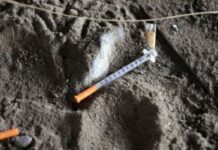“The Tantalizing Links between Gut Microbes and the Brain”
Nature magazine reports on recent discoveries by neuroscientists that microbes that live in the intestinal track may have an influence on brain development and behavior. “Researchers have drawn links between gastrointestinal pathology and psychiatric neurological conditions such as anxiety, depression, autism, schizophrenia and neurodegenerative disorders—but they are just links.”
Same-sex Marriage Laws Linked to Drop in Teen Suicide Attempts
From MinnPost: Laws legalizing same-sex marriage are associated with a significant drop in teen suicide attempts. In states that legalized same-sex marriage before June 2015, when...
“Downstream Drugs: Big Pharma’s Big Water Woes”
Writing for GreenBiz, Elizabeth Grossman reports on research on the increasing amounts of pharmaceuticals making their way into the environment. “They report on opiods, amphetamines and other pharmaceuticals found in treated drinking water; antibiotics in groundwater capable of altering naturally occurring bacterial communities; and over-the-counter and prescription drugs found in water leeching from municipal landfills.”
Coping With Trauma in the Classroom
From the Stamford Advocate: Increasing numbers of students have been affected by trauma; almost half of American adolescents have experienced an adverse childhood event. It...
Invitations to Crucial Re-orientation
In this lecture for the Forum for Existential Psychology and Therapy, Søren Hertz, a child and adolescent psychiatrist in Denmark, challenges our tendencies on to focus on individual...
Living Through the Catastrophe
In this piece for ROAR Magazine, Jerome Roos explores the psychological, social, and economic impact of living under the imminent threat of catastrophic man-made climate...
Protecting the LGBT Community is Good Health Policy
From The Hill: Research shows that LGBT individuals experience higher rates of physical and mental health problems than heterosexual people. Legislative policies that protect the rights of...
“The Curious Case of the Antidepressant, Anti-Anxiety Backyard Garden”
“My vegetable beds have even buoyed me through more acute stressors, such as my medical internship, my daughter’s departure for college, and a loved one’s cancer treatment,” writes Dr. Daphne Miller. Now neuroscientists are attempting to study the antidepressant effects of soil microbes in hopes of unlocking the secrets of a powerful mood enhancer.
Scientists Start to Tease Out the Ways Racism Hurts Health
From NPR: Scientists are beginning to understand the subtle ways that experiences of racism and discrimination affect people's health on both a physiological and psychological...
Here’s a Great This American Life Segment About Being Neurotic
From Science of Us: This week's This American Life, which addresses questions regarding whether extraterrestrial life exists, reveals a great deal of truth about what it...
How Your Germs Control Your Politics
In this podcast for Cracked, Alex Schmidt and David Wong discuss how our fear of germs has shaped our politics, preferences, and personalities throughout history.
"Stop...
Reflections on the Cruel and Subtle Costs of Racism and Bigotry
In this essay for the Psychiatric Times, Dr. Edward Khantzian reflects on the pain and grief caused by all forms of racism and bigotry, from...
The Link Between Opioids and Unemployment
From The Atlantic: A recent study found that increases in unemployment rates are associated with increased opioid overdoses and emergency room visits.
Article →
How War Gets “Under the Skin”
In this piece, Patrick Larkin explores the impact of war on growth and human development. A study he conducted on Hmong refugees in French Guiana...
“Pharmaceutical Prosthesis and White Racial Rescue in the Prescription Opioid ‘Epidemic’”
Critical psychiatry researcher, anthropologist and NYU professor Helena Hansen writes: “Opioid maintenance acts as a kind of pharmaceutical prosthesis which promises to return white ‘addicts’ to regaining their status as full human persons and middle-class consumers. Meanwhile, black and brown users are not deemed as persons to be rescued, but rather dangerous subjects to be pharmaceutically contained within the public discipline of the state.”
“Kids in Foster Care Three Times More Likely to be Diagnosed with ADHD”
PsychCentral presents a new study from the Center for Disease Control and Prevention (CDC) that found that foster care children are three times more likely than other children on Medicaid to receive a diagnosis of ADHD. Overall, more than one in four children in foster care receive such a diagnosis. CDC statistician Melissa Danielson interpreted these results as revealing a “substantial need” for more medical and behavioral services for kids in foster care.
Knowledge of Other Cultures is Changing the Field of Psychology
From The Conversation: Human behavior and mental processes have long been thought to be universal. However, recent studies show that culture plays an important role...
Touches Early in Life may Make an Impact on Newborns’ Brains
From Science News: A recent study found that early tactile experiences are associated with important differences in infants' brain responses and and patterns.
Article →
Risk of Psychosis Greater for People from Ethnic Minorities
From The Guardian: A new UK study shows that people from ethnic minorities have up to a five times greater risk of psychotic disorders than...
The Persistence of the Radioactive Bogeyman
From Bulletin of the Atomic Scientists: Since 1950, a noteworthy number of American and European horror movies have used radiation as a plot device. The...
Bringing Trauma-Informed Care to Children in Need
From STAT: Numerous studies have confirmed that adverse childhood experiences are common and can lead to negative long-term health outcomes. Many pediatricians and hospitals are working...
Emphasis on Nutrition Needed to Reform Mental Health Treatments
Even thought current mental health treatments are “suboptimal,” there is a lack of attention paid to the preventative effects of diet and nutrition. Recent studies suggests that nutritional changes can influence the risk for mental health issues and that nutritional supplements, called nutraceuticals, can be prescribed for existing conditions.
A Quiet Rise in Wildland-Firefighter Suicides
From The Atlantic: Over the past decade, there has been a quiet acknowledgement that suicide is widespread within the wildland firefighting community. Both the trauma...
“Can You Think Yourself into a Different Person?”
Will Storr, for Mosaic Science, wades into the world of neuroplasticity and explores to what extent our brains are capable of changing through adulthood. He asks if the tendency to overemphasize the findings of epigenetics and neuroplasticity isn’t tied to our cultural belief that individuals are totally free to create themselves and pursue the American dream.
Bill Would Introduce Fraud Convictions for Gay ‘Cure’ Therapists
From PinkNews: A new bill has been introduced in California would would see practitioners of gay conversion therapy prosecuted for fraud.
"The bill would build on the...



























